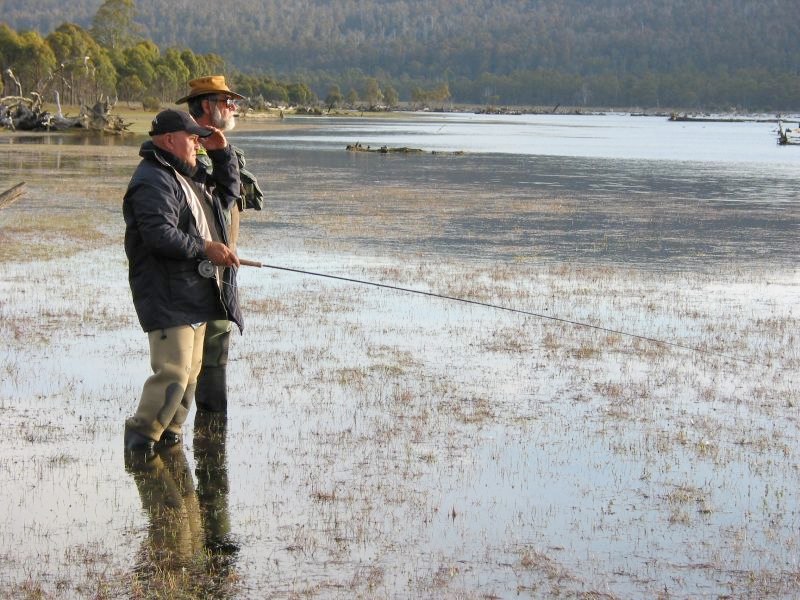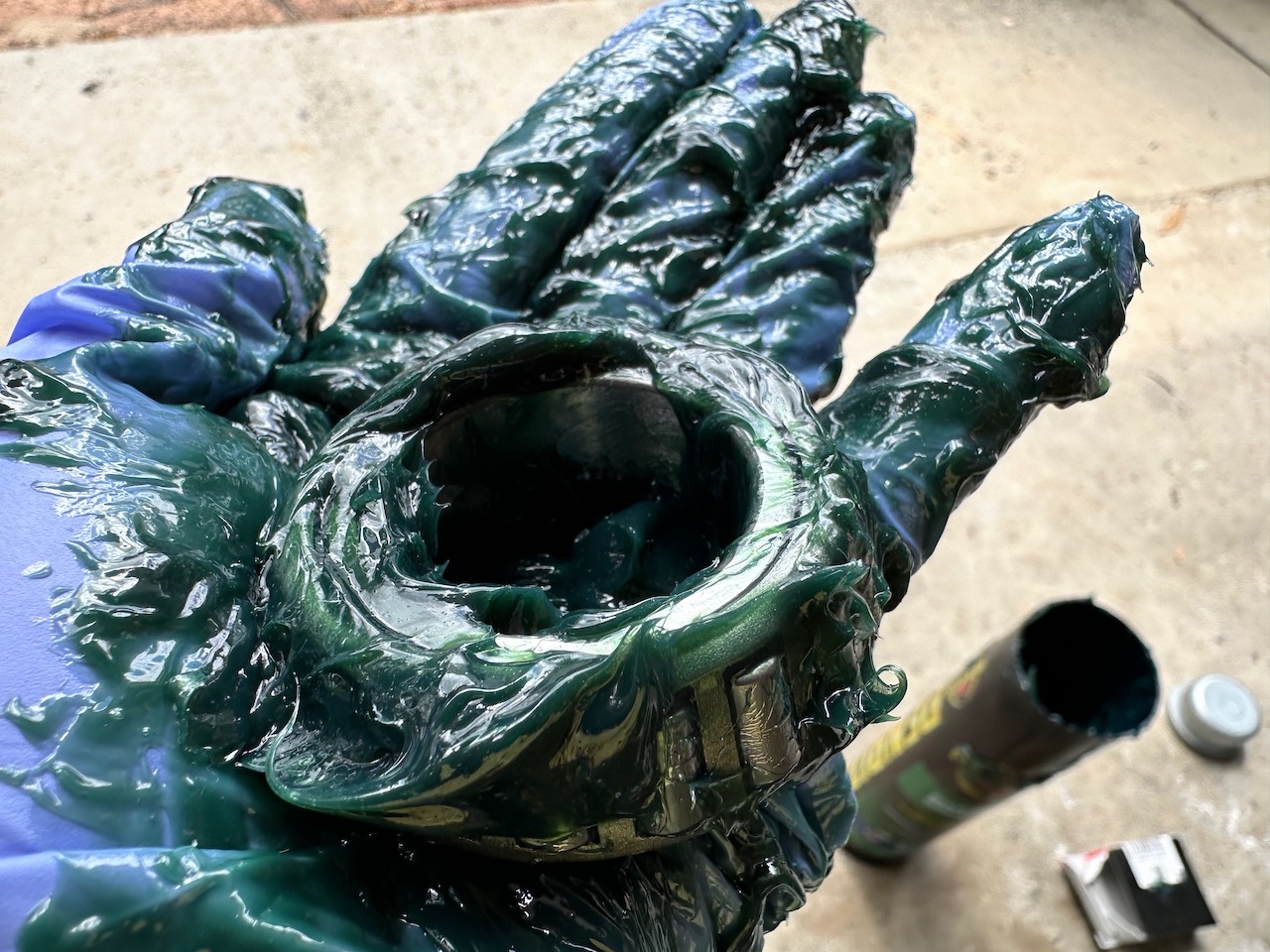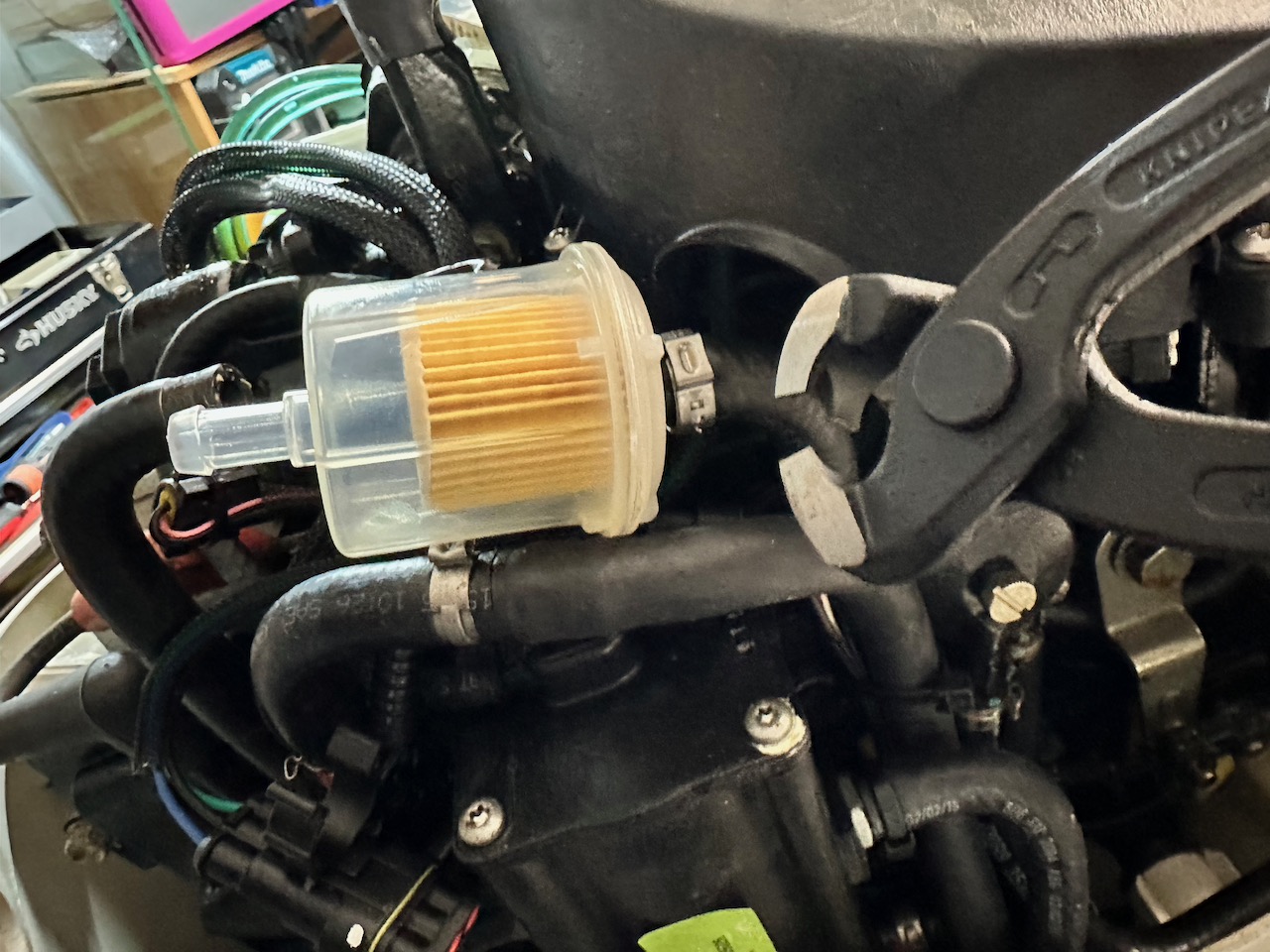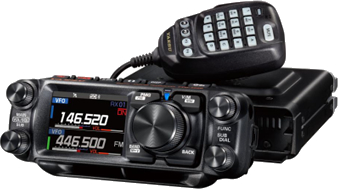Life, the Universe and Fishing
I was asked by Prof Evangeline Young to give a “Lunchtime Pizza talk” on the 15th May, 2009. Here is the text of the talk which is not really about fishing but concerns graduate research.

Introduction I started fishing rather late, at the age of 5. Although there are many things about my youth I cannot recall, I clearly remember my father taking me to our backyard, cutting down some bamboo, and then fashioning a fishing rod with some screws and bent nails being the additional pieces of hardware. We went to a nearby estuary and I caught 5 fish. That was the beginning of my love of the sport.
Fly fishing involves using an artificial fly, usually made by wrapping fur, feathers and other materials around a hook, to catch a fish. We do not know when fly fishing originated but an Oxford scholar, William Radcliffe, attributes the first literary reference to a Roman poet, Martial, some time between 10 B.C. and 20 A.D. who wrote, “Who has not seen the scarus rise, decoyed and killed by fraudful flies.”
This beautiful quote explains what fly-fishing is all about. In the first part of the sentence, “Who has not seen the scarus rise,” Martial refers to the habit of certain fish taking food in the form of insects from the surface of the water. Fish can be fooled into rising to take an imitation or “decoy” in which a hook is hidden.
A major practical problem needs to be solved before we can pursue fly fishing, that is, how to cast a fly. In most other forms of casting, a heavy object is thrown with a fishing rod, pulling a light line behind it. Unfortunately, the flies that we wish to deliver are often only a few millimeters in length and weigh almost nothing so this technique will not work. The way it is done in fly fishing is that a heavy “flyline” is cast using a rod. The weight of the flyline allows it to be delivered over a long distance and the fly is attached to the flyline via a thin, almost invisible nylon line.
Here is a typical scenario. Picture yourself in a crystal clear mountain stream. It is nearing dusk and a cloud of insects buzz around your head. You look into the water and see rings on the surface caused by a large brown trout quietly sipping insects from the surface. Dipping an aquarium net into the water, you collect some of the bugs which are floating with the current. The insects are mayflies and you reach into your flybox and tie on a fly which is similar in size, shape and colour to the natural.
You carefully wade into the water and move into position. With heart pounding you take a deep breath to calm your nerves and cast upstream, making sure not to cast over the fish and spook it. The fly lands gently, about 10 feet above the fish, and drifts in the current toward the fish. The fish is completely fooled, lazily rises and takes your fly.
You strike with the rod and instantly it folds over, pulsing with life. The fish hesitates for a moment, not quite understanding what has happened. It then charges downstream and you take after it, hardly noticing the moss-covered rocks, trees and other obstacles in your way. You are racing to keep up with the fish and tension on the line but the fish is getting further and further away. You know this since your 100 ft fly line is all in the water. At a deep pool, the fish fortunately stops and you feel more in control as you gain back some of the line. It jumps and for the first time you understand just how big it is. It could even be over the 4.5~kg (10~lb) mark and will be larger than any trout you’ve ever caught. It then makes a second run, this time upstream, securing its freedom by breaking the line. You are left trembling and looking stupidly at the slack line, replaying the event and wondering what you did wrong. This is fly-fishing and nobody who has ever had this experience would use the word “boring” to describe it.
For me, fishing is not just the action of walking to the nearest pool of water and dumping your line and hook in the water, it is an obsession. This essay is a random tour describing some of the things I learnt through fly fishing. It touches on many disciplines including biology, literature, poetry, art, physics, philosophy, religion, astronomy and, of course, cooking.
Gradual Improvement There are bigger fish, faster fish, ones which are easier or harder to catch, but none have received the same amount of attention as the trout. More has been written about this particular species of fish than about all others put together. Why? My contention is because it sometimes feeds on insects from the surface, thus making it a perfect target for fly fishing using dry flies, i.e. flies on the water’s surface.
Of course, a study of fishing involves understanding the fish itself. It has been said that 10% of the fishermen catch 90% of the fish. Like mathematics, playing tennis, learning a musical instrument or flying an aeroplane, one cannot expect to be good at it without a lot of practice. I am a believer in the theory that to become good at anything at all does not require a lot of talent but does need about 10,000 hours of practise.
At first, you are awkward and spend most of your fishing time untangling knots, retrieving your fly from trees and spooking fish. After a while you catch your first fish, an important milestone. You continue to learn from experienced fishermen who take the time to sit down with a stranger, explaining why they are successful and you are not. Often they make a present of their hand-tied flies or offer you a cup of coffee. You notice that they had the foresight to bring a spare cup. As you progress, you learn that the key to success is to curb your eagerness, slow down and approach the problem methodically.
Rather than think from the perspective of a human trying to catch a fish, you start to think like a fish and ask yourself where the prime spots in the river are located. These are places which offer both safety and easy access to food. You become better at reading rivers and lakes, being about to locate the deep holes and fast runs through the subtle cues that nature provides. You also think about where and when you should be fishing, the time of the day, the phase of the moon, the water level, weather etc. You learn that nearly everyone you see fishing in the middle of the day is doomed to failure since brown trout’s feeding habits are nocturnal. As one progresses even further, the pressure to catch lots of fish subsides, and you are happy just to be out fishing.
Nature In the fishing scenario described earlier, the mayfly was the source of food and, in fact, they have been described as the very foundation of the sport. The mayfly hatches from an egg at the bottom of the water in the form of a nymph which lives at the bottom of the water. The nymphs feed on algae, diatoms, plankton and other material. The mayfly nymph spends about 95% of its life underwater, a period of 1 to 2 years. When it becomes mature, gasses collect in its outer shell and it floats to the surface and separates itself from its outer shell. This process is called “emerging”.
The mayfly dun stage lasts from 1 to 4 days and the insects have upright wings which they must dry and strengthen before flight. When they are strong enough, the mayfly can fly and it rests and molts to become a spinner which is the last stage.
Mayfly spinners live only for a day which is kind of sad. Male and female spinners mate and the males die straight away. The females, more hardworking than the males, have one final mission to complete before they die, that is to lay their eggs. The more one experiences and studies this remarkable process, the more profound it appears, and in fact, hundreds of books have been written about this subject.
Fly fishermen spend lots of time waiting for conditions to be just right. When they are, the mayflies hatch in enormous numbers, causing the trout to throw their natural caution to the wind and go into a feeding frenzy. This happens just often enough to keep a fisherman interested, but not so often that it can ever be counted on.
Even when a massive hatch of mayflies occurs and the trout are rising all over the river to them, it doesn’t mean that you will catch a fish. If there are thousands of natural insects on the water, why should the trout take a fly? As I’m sure one can appreciate, the fly is only a caricature of the natural and does look different. Fishing through an enormous hatch with fish rising furiously everywhere and not getting a single fish to even look at your fly is a sobering experience. At the point you think those fish are impossible to catch, you’ll see a trout confidently take a cigarette butt.
Outdoors Obsessed as many fly fishermen are, there are many attractions to the sport apart from just the fishing part. Trout live in mountainous regions with clean, cool running water and lots of vegetation in and around the water to supply food. I have been fortunate to fish for trout in locations such as Australia, New Zealand, Italy and the US. Just being outdoors, solving the big or little problems that are bound to arise in any extended trip and to work with, rather than against the forces of nature has taught me a lot.
I have camped in places far from civilization during the new moon when it was so dark that you cannot see your hand in front of your eyes. If you look up, you can see the vastness of the entire universe. Instead of individual stars, you see clouds of white and you realize how insignificant we are in the grand scheme of things.
I believe that the best fishing is to be experienced a long way from the city in places with difficult access that requires long walks and overnight stays to get there. Such places have less fishing pressure and are more beautiful. Although most fly fishermen I know practice catch and release, keeping one or two for dinner is fine, although it should be done humanely and with a slightly guilty conscience.
An excellent way to prepare trout is to wrap it in foil with some onion, tomato and lemon slices. Add some salt, paper and olive oil and cook for about 20 minutes in the ashes of a fire. The foil serves to keep in the juices and the fish is kept moist in this process. A fresh wild trout caught far from civilization, prepared in this manner and eaten outdoors is always a memorable meal. Such a meal after a successful day of fishing is just as much a highlight of a trip as catching the fish itself.
People have fished as a means of survival as far back as we can trace history and fishing tools date back about 40,000 years ago. Of course, in those times, fishing was a means of survival. However, even in those days I believe that, of an evening after a particularly good session, the men sat around the fire boasting about their fishing prowess and the one that got away.
Literature There are more than 11,000 books being sold at Amazon on fishing and more than 3,000 on fly fishing. There are specialized books on entomology, fishing locations, fly tying, fishing tactics, fishing photography, casting etc. One can find books just on mayflies, knots or rod building. I have a lot more books on fishing than I do on computer science.
One of my favourite books is “A River Runs through It.” It is an autobiographical short story written by Norman McClean, an English professor, which was later made into a film by Robert Redford in 1992.
The first few sentences are as follows, “In our family, there was no clear line between religion and fly fishing. We lived at the junction of great trout rivers in western Montana, and our father was a Presbyterian minister and a fly fisherman who tied his own flies and taught others. He told us about Christ’s disciples being fishermen, and we were left to assume, as my brother and I did, that all first-class fishermen on the Sea of Galilee were fly fishermen and that John, the favorite, was a dry-fly fisherman.”
The Australian poet, Banjo Patterson, wrote “A Ballad of Ducks” which describes a grasshopper plague. Here is a verse, “We were drinkin’ grasshoppers—so to speak – Till we skimmed their carcasses off the spring; And they fell so thick in the station creek They choked the waterholes all the week. There was scarcely room for a trout to rise, And they’d only take artificial flies – They got so sick of the real thing.”
The Future Man’s status at the top of the food chain can be ascribed to our ability to develop tools and techniques to solve practical problems. I am pessimistic about the future of fly fishing as it is through our intelligence that we have the ability to completely exhaust fish stocks through overfishing and environmental damage. Fishing groups have lobbied governments for improved management of fisheries and there are many success stories of potentially damaging projects being stopped by such efforts. Unfortunately, in the name of progress, more and more such projects are being proposed and it appears to me that money usually trumps fishing or the environment in the long term. I believe we should do more to stop the deterioration of our planet and promote sustainable fisheries for future generations.
Conclusion I have learnt many things through fishing and find that being successful in fishing has many similarities with being a good researcher. Irrespective of whether you ask me how to be a good researcher or a good fisherman, I would give the following suggestions:
1. Fish fertile waters. One of the important things in fishing is being at the right place at the right time. If you do the wrong thing, you will not be successful. In your research, try to learn what is productive and what is not.
2. Learn from others. Don’t be afraid to ask people things, most would be very flattered to be asked, you will learn faster and even make new friends.
3. Be persistent, life is not meant to be easy. I have caught a marlin using a fly. It would have been a world record had it been claimed and was taken on the last cast of a 3 day trip. I was not a particularly good fisherman at the time and believe I was rewarded. You should really believe in what you do and work 100% to achieve it.
4. Strive to improve. Learn to be content with what you achieve, learn from your mistakes and work actively to improve.
5. Slow down and think before you act. Myself and many others spend too much time working rather than thinking. The latter is harder to do but unfortunately good research cannot be achieved through hard work alone. Inspiration has often come to me only when I have had the time to think and question what I am doing. This has often been while fishing.
6. Do what you are interested in and aim high. You can only excel at something you are interested in. Pursue your interests, work hard and you will be very surprised at what you can achieve.
I end with a quote from Henry David Thoreau who described it perfectly when he wrote, “Many men go fishing all of their lives without knowing that it is not fish they are after.”



